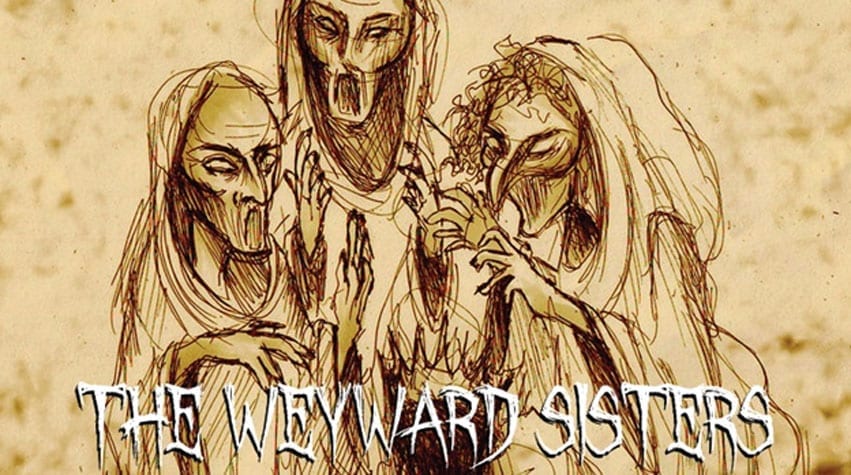Salt Lake City — PYGmalion Productions’ new play, The Weyward Sisters, written by L. L. West and directed by Robin Wilks-Dunn, takes place backstage at the Globe Theater during the debut of Macbeth. There, three actual witches who have been cast as the Weird Sisters, rehearse and get into costume between scenes.
Each witch had her own desk bedecked with items that bespoke her character (stage manager, Annie Brantley). As the play begins, Leandra (Betsy West) busies herself with the mirror and trinkets covering her desk while Skye (Ali Lente) takes a break from her stack of books to lecture Leandra on the intricacies of iambic pentameter and trochaic tetrameter. The two witches have a bit of an odd couple relationship going: Skye the organized scholar with her neat braid, and Leandra, the vain procrastinator with her wild red hair. Their relationship is set off balance, though, when Fioon (Tamara Howell) arrives. Fioon is described by her compatriots as youthful and pure, her short hair is neatly combed, and she wears a coquettish smile. She and Leandra are in the midst of an ongoing feud, and they express their antipathy for one another via jibes and pranks.

The actors wore leggings, blouses, and loose-fitting robes for most of the play, but just before heading offstage (and onto The Globe’s stage) for their Macbeth scenes, the actors would don wild grey wigs, wrinkled masks, and raggedy black robes (costume design Maddiey Howell). An eerie recording of an excerpt from the ensuing scene would then play. The sound quality for these excerpts was quite grainy, but I presume they were intentionally taken from aged recordings to increase the eeriness-factor (sound design, Todd Olsen).
While The Weyward Sisters’ acting, direction, and technical aspects of the play were entirely adequate, the script itself felt unpolished. Rather than developing the plot or character relationships, the script focused on insignificant details, such as the difference between trochaic tetrameter and iambic pentameter, or the exact ingredients of a potion. These sections didn’t push the story forward, and though they may have been intended for humor, the comedy didn’t hit home often enough to prevent these stretches from dragging. This was particularly unfortunate because there wasn’t enough time left to develop the actual plot. A lot of interesting possibilities and details were glossed over, and I left feeling confused and full of questions. So many questions.
Macbeth is easily my favorite Shakespeare play: it’s bizarre and magical, and everyone is dysfunctional and irrational, and I love watching them all mess with each other. I was thrilled at the opportunity to see a play about actual witches getting comically mixed up in the action. I was ultimately disappointed by this script. The three witches’ paranormal qualities had only tangential relationship to the action. Instead, the main way the witches impacted Macbeth was by bumbling through their lines.
I admit that I might have misunderstood what was going on all along. The program explains the time period as “think Existential with a dash of the Medieval,” and place as, “storage area turned into make-shift dressing room.” So maybe the existential bit is that it all actually took place in Shakespeare’s imagination, and this is how the play evolved while he was writing it. I actually have no idea. I have thought and thought about it, and I am at a loss.
Wilks-Dunn’s idea for casting three actual witches in Shakespeare’s original production of Macbeth is great. I love the concept, and the witches’ relationships showed real promise and a lot of great one-liners. Unfortunately, the idea currently resides in a half-baked script. The story is confusing, the character relationships don’t make sense, and a lot of good ideas are hinted at without being fully developed. Still, I’d love to see the play again once Wilks-Dunn polishes up this rough draft.
[box type=”shadow”]The Weyward Sisters played at the Courage Theatre, Westminster College August 6-9, 2015, as part of the Salt Lake Fringe Festival. For upcoming information on Pygmalion Productions go to pygmalionproductions.org[/box]
